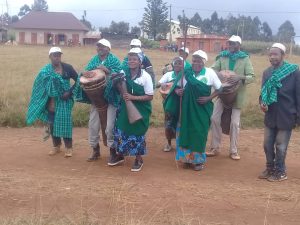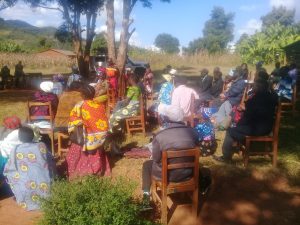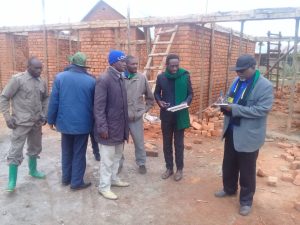Leveraging Local Insights to Drive COVID-19 Vaccine Uptake in Njombe, Tanzania
Vaccination Action Network: Local Solutions to Catalyze Change
 On June 7, 2022, 16 immunization and public health professionals from the Njombe region of Tanzania gathered to tackle a major challenge. COVID-19 vaccine demand and uptake remained low in Njombe despite advances in supply and access.
On June 7, 2022, 16 immunization and public health professionals from the Njombe region of Tanzania gathered to tackle a major challenge. COVID-19 vaccine demand and uptake remained low in Njombe despite advances in supply and access.
Like many regions in Tanzania, Njombe had implemented numerous strategies and investment to accelerate acceptance and uptake of the COVID-19 vaccine. The first two national campaigns resulted in low vaccine uptake in Njombe region, as did subsequent efforts by implementing partners to promote vaccination through music, theater, and other health communication approaches.

Convened by the Vaccination Action Network (VAN), supported by The Rockefeller Foundation, Dalberg Advisors, Sabin Vaccine Institute, and Amref Health Africa, this group set an audacious goal – to increase COVID-19 vaccination rates from 17% to 40% by leveraging local expertise and collaborative problem-solving.
The Problem-Solving Process
Participants in the VAN meeting represented not only national and regional immunization stakeholders, but also included public health professionals from each of the districts in the Njombe region. Based on their detailed understanding of their communities, they began by unpacking the top COVID-19 vaccine uptake and confidence challenges to better understand why the region was below the 40% target. The group prioritized what they considered to be the most pressing issues:
- The lack of community understanding of COVID-19 and the vaccine.
- The dissuasion of COVID-19 vaccination by influential religious,
political, and traditional leaders.
Combined, these barriers created unwillingness among people to take the vaccine. Participants recognized their current approaches were not working to solve these challenges.
A facilitated brainstorming process was used to generate solutions that met these prioritized challenges, developing strategies to drive vaccine confidence and demand in the communities in which they work. They identified three key solutions to address the prioritized challenges:
- Going hyper-local – Engaging political, traditional, and religious
leaders at the village/ward level and empowering them to effectively
reach their audiences with accurate and up-to-date information. - Minimizing access barriers – Pairing community outreach with service
delivery to minimize the effort needed to get vaccinated in
coordination with the district councils and ward councilors. - Training healthcare workers – Conducting sensitization and
communication training for healthcare workers at multiple levels to
ensure they are well-prepared to address vaccine concerns and
communicate vaccine effectiveness and urgency.
For each of these three solutions, district councils developed both district specific and cross-cutting solutions to implement based on unique circumstances within each district.
Through this process, participants recognized the importance of leveraging community insights when developing health promotion strategies, noting that who shares information and how and where they share it are just as important as the information itself. “It is not about what was told to community members [to encourage vaccination] but how it was disclosed and who was delivering the message. Identifying trusted sources, using simple and sensitive language, and bringing both information and vaccines to varying settings can help tackle low vaccination rates,” says Mr. Samson Soro Sasi, Njombe Health Promotion Lead.
From Insights to Implementation
Immunization and public health professionals in the Njombe region directly moved to implement these solutions after the VAN meeting, initiating their third round of COVID-19 vaccine campaigns.

The Njombe Regional Health Management Team (RHMT), in collaboration with implementing partners, applied these learnings and implemented numerous strategies to drive COVID-19 vaccine demand with a focus on increasing pro-vaccine messages from trusted sources alongside improved access. New and updated practices included:
- Partnership between the RHMT and Community Health Management Teams (CHMTs) to identify wards with low uptake and arrange sensitization meetings with influential community leaders, including local religious leaders.
- Community mobilization by community leaders with easy-to-access vaccination services in popular community settings, including places of worship and gathering, community sites, market areas, and bus stops.
- House-to-house sensitization conducted by community health workers and community leaders included vaccinators to remove access barriers. and encouraged community members to ask questions and seek answers from trusted community leaders.

Combined with other strategies, such as the integration of other community development programs with COVID-19 vaccines and helping healthcare workers and political leaders share vaccine messages through out-of-studio radio programs, the Njombe RHMT built a layered approach that incorporated the best practices identified through the VAN problem-solving session.
Turning the Tide
These improved interventions had dramatic results: the fully immunized percentage of the eligible population in the Njombe region increased from 17% to 51% in just 10 days after implementing the strategies developed during the VAN convening. By applying similar strategies during a follow-on 7-day campaign in September 2022, the region reached a 79% vaccination rate, exceeding all targets set.
Reflecting on what changes made the most impact on vaccination uptake, Mr. Samson Soro Sasi noted that facilitating outreach services and house-to-house sensitization with a team of trusted local leaders and vaccinators provided an opportunity for community members to ask questions and trust the answers.

The Njombe RHMT intends to continue leveraging insights from campaigns to drive further improvements, creating a learning cycle based on local expertise. Next steps include applying these successful strategies in other low-uptake councils, identifying regional best practices, and creating a uniformly-applied strategy throughout the region. Mr. Samson Soro Sasi believes these approaches will allow Njombe region to reach vaccination levels above 80%.
He urges all immunization professionals to consider exploring answers from those involved in these vaccine campaigns within their targeted community. “Holding sessions like the VAN intra-country session facilitated experts from within the community to identify common challenges and share experiences on how they could tackle them together” is critical, he says. “If the region were to be involved in designing strategies, I believe we [would develop a] cost effective and high yield strategy.”
 Contributor
Contributor
This story was shared by Samson Soro Sasi, Njombe Region Health Promotion Lead. Mr. Soro Sasi’s role includes coordinating health promotion activities in the region, providing technical support for the design and implementation of health promotion strategies through the Regional Health Management Team within the Regional Secretariat
Vaccination Action Network
The Vaccination Action Network (VAN) is an Africa-led action-oriented collaborative that brings together vaccination leaders and senior public health officials to solve the toughest challenges in improving COVID-19 vaccine demand and uptake across Africa. VAN provides a space for learning and peer exchange among immunization practitioners, focusing on demand-related challenges, best practices, and lessons learned that are specific to the local context. Local Solutions to Catalyze Change share interventions implemented by VAN members to improve COVID-19 vaccine uptake.

